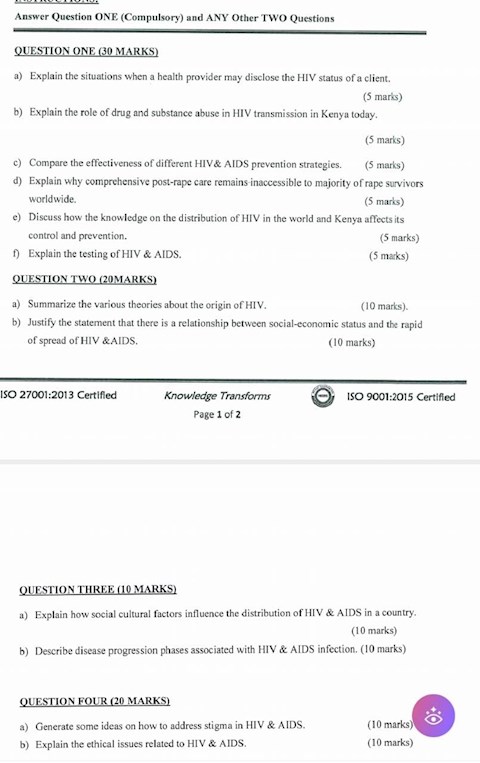1 answer
Sort By

ilyas mirza
Sep 17, 2023
HIV/AIDS testing is a crucial part of HIV prevention, treatment, and care. There are several methods for testing for HIV, and I'll provide an overview of the most common ones:
1. **Antibody Tests:**
- **ELISA (Enzyme-Linked Immunosorbent Assay):** This is often the first test used. It detects antibodies produced by the immune system in response to HIV infection. If the ELISA test is positive, further testing is done to confirm the result.
- **Western Blot:** If the ELISA test is positive, a Western blot test is usually performed to confirm the presence of HIV antibodies. It is highly specific but may take several days to get results.
2. **Antigen Tests:**
- **Fourth-Generation HIV Test:** This test detects both HIV antibodies and p24 antigens, which are viral proteins. It's more accurate than the older tests and can detect HIV earlier in the infection.
3. **Nucleic Acid Tests (NATs):**
- **PCR (Polymerase Chain Reaction) Test:** This test detects the genetic material (RNA) of the virus rather than antibodies or antigens. It's highly sensitive and can detect HIV very early after infection.
4. **Rapid HIV Tests:**
- **Point-of-Care Tests:** These provide results in as little as 20-30 minutes and are often used in clinics, community health centers, and home testing kits. They may be antibody-based or combination tests.
5. **Home HIV Tests:**
- Some countries offer over-the-counter HIV test kits that allow individuals to collect a sample at home and receive results privately. Positive results should always be confirmed by a healthcare professional.
It's important to note that HIV tests are typically done with informed consent, and counseling is often provided before and after testing to help individuals understand the implications of the results.
Testing for HIV is essential for early diagnosis and access to treatment. Early treatment can help manage the virus, slow the progression to AIDS, and reduce the risk of transmission to others. HIV testing is usually confidential, and in many places, anonymous testing is also available to protect an individual's privacy.
1. **Antibody Tests:**
- **ELISA (Enzyme-Linked Immunosorbent Assay):** This is often the first test used. It detects antibodies produced by the immune system in response to HIV infection. If the ELISA test is positive, further testing is done to confirm the result.
- **Western Blot:** If the ELISA test is positive, a Western blot test is usually performed to confirm the presence of HIV antibodies. It is highly specific but may take several days to get results.
2. **Antigen Tests:**
- **Fourth-Generation HIV Test:** This test detects both HIV antibodies and p24 antigens, which are viral proteins. It's more accurate than the older tests and can detect HIV earlier in the infection.
3. **Nucleic Acid Tests (NATs):**
- **PCR (Polymerase Chain Reaction) Test:** This test detects the genetic material (RNA) of the virus rather than antibodies or antigens. It's highly sensitive and can detect HIV very early after infection.
4. **Rapid HIV Tests:**
- **Point-of-Care Tests:** These provide results in as little as 20-30 minutes and are often used in clinics, community health centers, and home testing kits. They may be antibody-based or combination tests.
5. **Home HIV Tests:**
- Some countries offer over-the-counter HIV test kits that allow individuals to collect a sample at home and receive results privately. Positive results should always be confirmed by a healthcare professional.
It's important to note that HIV tests are typically done with informed consent, and counseling is often provided before and after testing to help individuals understand the implications of the results.
Testing for HIV is essential for early diagnosis and access to treatment. Early treatment can help manage the virus, slow the progression to AIDS, and reduce the risk of transmission to others. HIV testing is usually confidential, and in many places, anonymous testing is also available to protect an individual's privacy.
0
